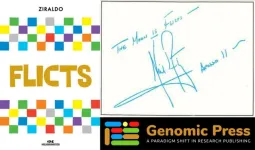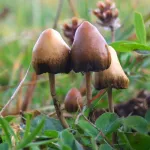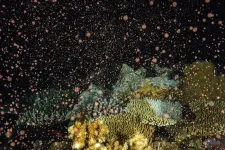(Press-News.org) SAN BERNARDINO, California, USA, 17 December 2024 - In a compelling Genomic Press Interview, Editor-in-Chief Dr. Julio Licinio reveals how a children's book about a lonely color has shaped the innovative vision of scientific publisher Genomic Press. The story of Flicts, penned by renowned Brazilian artist Ziraldo Alves Pinto, has become more than just a brand element – it represents a revolutionary approach to academic publishing.
"Sometimes the ideas that don't fit anywhere else are precisely the ones that help us reach the stars," explains Dr. Licinio, highlighting the publisher's mission to support research that transcends traditional academic boundaries. This philosophy stems from Flicts, a tale about a color that found its true home not on Earth but on the moon – a connection famously acknowledged by astronaut Neil Armstrong with his handwritten note: "The Moon is Flicts."
The significance of Flicts extends beyond its literary origins. Written during the height of the Space Race in 1969, the story captured both the isolation of innovation and the boundless possibilities of exploration. Ziraldo, who passed away in April 2024 at age 91, created more than just a children's story – he crafted a metaphor that would resonate deeply with scientific pioneers decades later.
The timing of this editorial coincides with significant developments in cross-disciplinary research publishing. As scientific fields increasingly overlap, researchers often struggle to find appropriate venues for work that doesn't fit neatly into established categories. Genomic Press's journals – Brain Medicine, Genomic Psychiatry, and Psychedelics – specifically target this gap in academic publishing.
Dr. Licinio points to the unique character of Flicts – technically a "fictional color" with precise digital values (Hex D49126 or RGB 212,145,38) – as a metaphor for research that exists between established categories. "What color is consciousness?" he asks. "Where in the traditional rainbow do you file research that bridges neuroscience and psychedelic therapy?"
The editorial raises intriguing questions about the future of scientific publishing: How might other disciplines benefit from similarly innovative approaches to categorical boundaries? Could this model help advance other emerging fields where traditional publication venues prove inadequate?
The story of Flicts, published in 1969 – the same year as the moon landing – continues to resonate with contemporary challenges in academic publishing. "Like Flicts being told there is no room in the rainbow, researchers have often been told their work is 'too cross-disciplinary' or 'doesn't fit our scope,'" notes Dr. Licinio.
Genomic Press has already begun implementing this philosophy through several groundbreaking initiatives. The publisher's peer review process specifically welcomes interdisciplinary perspectives, and its editorial boards include experts from diverse scientific backgrounds. "When researchers come to us with work that crosses traditional boundaries, they're not just finding a publisher – they're finding a home for ideas that could reshape our understanding of science," explains Dr. Licinio.
This innovative approach has already attracted attention from leading researchers in emerging fields such as computational psychiatry, psychedelic medicine, and neural interface development. The publisher's commitment to breaking down traditional barriers is particularly relevant as science increasingly moves toward integrated, systems-level approaches to complex problems.
The complete editorial, titled "Genomic Press and the moon are Flicts: A tale of belonging and innovation," is available on December 17, 2024 in Genomic Psychiatry. The article is freely accessible online at https://doi.org/10.61373/gp024d.0091.
About Genomic Press: A transformative scientific publisher committed to advancing cross-disciplinary research through its peer-reviewed medical research journals Brain Medicine, Genomic Psychiatry, and Psychedelics. The publisher maintains a strong focus on innovative research that challenges traditional academic boundaries. For more information, visit https://genomicpress.kglmeridian.com/.
END
Genomic Press transforms scientific publishing, inspired by moon-bound color story
Brazilian story about misfit color finds new purpose in advancing cross-disciplinary research
2024-12-17
ELSE PRESS RELEASES FROM THIS DATE:
Addiction neuroscience leader reveals how brain circuits drive behavioral disorders
2024-12-17
CHARLESTON, South Carolina, USA, 17 December 2024 - In a comprehensive Genomic Press Interview published today in Brain Medicine, renowned neuroscientist Dr. Peter Kalivas reveals crucial insights into how brain circuits drive addictive behaviors and discusses potential new drug targets for treating behavioral disorders.
Dr. Kalivas, Distinguished University Professor at the Medical University of South Carolina, has transformed our understanding of addiction neuroscience through his pioneering work on the tetrapartite synapse - a complex cellular structure that includes neurons, astroglia, and the extracellular matrix. His ...
Neuroscientist maps brain's fundamental calculations in learning and social interaction
2024-12-17
PHILADELPHIA, Pennsylvania, USA, 17 December 2024 - In a comprehensive Genomic Press Interview, Dr. Munir Gunes Kutlu, Assistant Professor at Temple University's Center for Substance Abuse Research, unveils revolutionary findings about how our brains process fundamental learning calculations and social interactions.
"Our research has identified specific neural mechanisms that transform sensory inputs into behavioral outputs," says Dr. Kutlu. "We've discovered that the brain's dopamine system works in more sophisticated ways than previously understood, particularly in how it processes information about environmental cues and rewards."
The interview, published ...
Attitudes toward psychedelic therapy reveal both promise and caution, new study finds
2024-12-17
ATLANTA, Georgia, USA, 17 December 2024 - In a comprehensive Genomic Press Interview with researchers from Emory University, a new study published today reveals complex attitudes toward psychedelic therapy, with detailed statistics showing both strong support for potential benefits and significant awareness of risks.
The research, published in the journal Psychedelics, surveyed 178 attendees at an academic conference focused on psychedelics and spiritual care. Among participants, 32 were active psychedelic ...
Leuven researchers discover new connectivity rules in the brain’s visual network
2024-12-17
Leuven, Belgium, 17 December 2024 – Researchers at Neuro-Electronics Research Flanders (NERF), led by Prof. Vincent Bonin, have published two new studies uncovering how visual information is processed and distributed in the brain. The studies reveal the complexity and flexibility of visual information processing in the brain.
The visual cortex, a key region for interpreting and processing visual input, plays a crucial role in shaping what we see. Vincent Bonin, a professor at KU Leuven and group leader at NERF, studies the neural circuits that process sensory information. "We often think of visual processing ...
Patients whose allergies cause the sniffles have different fungi living in their noses, compared to healthy people
2024-12-17
Nearly a quarter of Portuguese adults have allergies that cause a runny nose. This respiratory disease, formally called allergic rhinitis and frequently associated with asthma, is a common problem around the world, and the upper airway is a key target for research into the underlying disease processes. Now a global team of researchers has discovered that patients with allergy-induced sniffles and asthma have different fungal colonies or mycobiomes in their noses, suggesting potential lines of enquiry for future treatments.
“We showed that allergic rhinitis ...
The psychological implications of Big Brother’s gaze
2024-12-17
A new psychological study has shown that when people know they are under surveillance it generates an automatic response of heightened awareness of being watched, with implications for public mental health.
In a paper published in the journal Neuroscience of Consciousness psychology researchers from the University of Technology Sydney (UTS) worked with 54 participants to examine the effects of surveillance on an essential function of human sensory perception – the ability to detect another person’s gaze.
Lead author, Associate Professor of neuroscience and behaviour Kiley Seymour, said previous research has established the effects on conscious behaviour when people know they ...
Sylvester Cancer Tip Sheet for Dec. 2024
2024-12-17
DECEMBER 2024 TIP SHEET: A behavioral expert offers advice for dealing with loss and holiday grief, a physician-scientist explains using “biological age” as a tool to predict early colorectal cancer risk, a cancer leader receives a prestigious award for mentorship, blood cancer experts share research insights that may eventually lead to a cure for multiple myeloma, a recent study shows genetic mutations accumulate in smokers with MDS, two clinical trials show promise for using an antibody to treat high-risk forms of lymphoma and ongoing research seeks answers for higher breast cancer ...
Up to $47 million award supports collaborative eye transplant research co-led by USC
2024-12-17
A federal funding agency that supports high-impact research capable of driving biomedical and health breakthroughs has awarded up to $47 million for a project aimed at moving eye transplants to restore vision closer to reality. The six-year award from the Advanced Research Projects Agency for Health (ARPA-H) Transplantation of Human Eye Allografts (THEA) program is intended to supercharge an interdisciplinary effort to bring eye transplantation forward to clinical trial.
To date, only one whole-eye transplant has ever been successfully ...
Corals depend on near neighbours to reproduce
2024-12-17
A new study reveals corals must be within only a few metres of each other to successfully reproduce, leaving them vulnerable in a warming world.
The international research, led by The University of Queensland’s Professor Peter Mumby, measured the success of a natural spawning event in March this year.
“In what came as a surprise, we saw that corals needed to be within 10 metres of one another, and preferably closer than that for fertilisation to take place,” Professor Mumby said.
“We knew corals couldn’t be too ...
Most coastal Arctic infrastructure faces instability by 2100
2024-12-17
Researcher contacts:
Annett Bartsch, b.geos GmbH, annett.bartsch@bgeos.com (UTC+1 hour)
Rodrigue Tanguy, b.geos GmbH, rodrigue.tanguy@bgeos.com (UTC+1 hour)
AGU press contact:
Rebecca Dzombak, news@agu.org (UTC-5 hours)
WASHINGTON — A new study has produced the first map of all coastal communities and infrastructure across the Arctic, showing the vulnerability of the built environment to threats from climate change. Erosion is currently the biggest threat to Arctic coastlines; some places are already experiencing ...
LAST 30 PRESS RELEASES:
DEGU debuts with better AI predictions and explanations
‘Giant superatoms’ unlock a new toolbox for quantum computers
Jeonbuk National University researchers explore metal oxide electrodes as a new frontier in electrochemical microplastic detection
Cannabis: What is the profile of adults at low risk of dependence?
Medical and materials innovations of two women engineers recognized by Sony and Nature
Blood test “clocks” predict when Alzheimer’s symptoms will start
Second pregnancy uniquely alters the female brain
Study shows low-field MRI is feasible for breast screening
Nanodevice produces continuous electricity from evaporation
Call me invasive: New evidence confirms the status of the giant Asian mantis in Europe
Scientists discover a key mechanism regulating how oxytocin is released in the mouse brain
Public and patient involvement in research is a balancing act of power
Scientists discover “bacterial constipation,” a new disease caused by gut-drying bacteria
DGIST identifies “magic blueprint” for converting carbon dioxide into resources through atom-level catalyst design
COVID-19 vaccination during pregnancy may help prevent preeclampsia
Menopausal hormone therapy not linked to increased risk of death
Chronic shortage of family doctors in England, reveals BMJ analysis
Booster jabs reduce the risks of COVID-19 deaths, study finds
Screening increases survival rate for stage IV breast cancer by 60%
ACC announces inaugural fellow for the Thad and Gerry Waites Rural Cardiovascular Research Fellowship
University of Oklahoma researchers develop durable hybrid materials for faster radiation detection
Medicaid disenrollment spikes at age 19, study finds
Turning agricultural waste into advanced materials: Review highlights how torrefaction could power a sustainable carbon future
New study warns emerging pollutants in livestock and aquaculture waste may threaten ecosystems and public health
Integrated rice–aquatic farming systems may hold the key to smarter nitrogen use and lower agricultural emissions
Hope for global banana farming in genetic discovery
Mirror image pheromones help beetles swipe right
Prenatal lead exposure related to worse cognitive function in adults
Research alert: Understanding substance use across the full spectrum of sexual identity
Pekingese, Shih Tzu and Staffordshire Bull Terrier among twelve dog breeds at risk of serious breathing condition
[Press-News.org] Genomic Press transforms scientific publishing, inspired by moon-bound color storyBrazilian story about misfit color finds new purpose in advancing cross-disciplinary research






